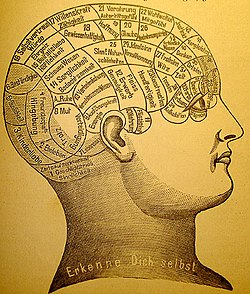
Back حدس Arabic İntuisiya Azerbaijani Інтуіцыя Byelorussian Интуиция Bulgarian স্বজ্ঞা Bengali/Bangla Intuïció Catalan بەبیناوھێنان CKB Intuice Czech Intuition Danish Intuition German

Intuition is the ability to acquire knowledge without recourse to conscious reasoning or needing an explanation.[2][3] Different fields use the word "intuition" in very different ways, including but not limited to: direct access to unconscious knowledge; unconscious cognition; gut feelings; inner sensing; inner insight to unconscious pattern-recognition; and the ability to understand something instinctively, without any need for conscious reasoning.[4][5] Intuitive knowledge tends to be approximate.[6]
The word intuition comes from the Latin verb intueri translated as 'consider' or from the Late Middle English word intuit, 'to contemplate'.[2][7] Use of intuition is sometimes referred to as responding to a "gut feeling" or "trusting your gut".[8]
- ^ Elbs, Oliver (2005). Neuro-Esthetics: Mapological foundations and applications (Map 2003). Munich.
{{cite book}}: CS1 maint: location missing publisher (link) - ^ a b "intuition". Merriam-Webster. Retrieved 22 December 2014.
- ^
- "intuition". Oxford Dictionaries. Archived from the original on July 19, 2012. Retrieved 22 December 2014.
- Epstein, Seymour (30 November 2010). "Demystifying Intuition: What It Is, What It Does, and How It Does It". Psychological Inquiry. 21 (4): 295–312. doi:10.1080/1047840X.2010.523875. S2CID 145683932.
- ^
- Aurobindo, Sri (1992). The synthesis of yoga. Pondicherry: Sri Aurobindo ashram trust. pp. 479–480. ISBN 978-0-9415-2465-0. Retrieved 26 December 2014.
- Rosenblatt, A.D.; Thickstun, J.T. (October 1994). "Intuition and consciousness". Psychoanal. Q. 63 (4): 696–714. doi:10.1080/21674086.1994.11927433. PMID 7846187.
- ^ Cite error: The named reference
:1was invoked but never defined (see the help page). - ^ Angier, Natalie (2008-09-16). "Intuition and math: A powerful correlation". The New York Times. ISSN 0362-4331. Retrieved 2022-09-27.
- ^ "intuition | Etymology, origin and meaning of intuition by etymonline". www.etymonline.com. Retrieved 2023-08-12.
- ^ Wilding, M. (10 March 2022). "How to Stop Overthinking and Start Trusting your Gut". Harvard Business Review. Retrieved 21 September 2022.